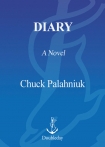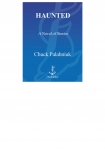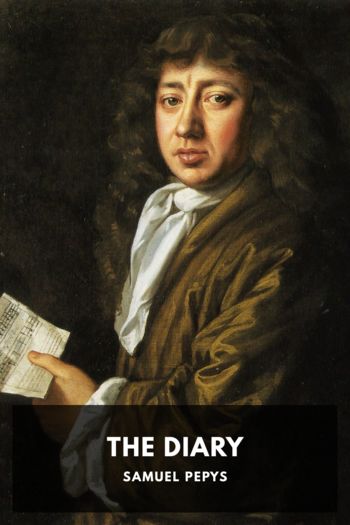Diary, Chuck Palahniuk [spicy books to read .TXT] 📗

- Author: Chuck Palahniuk
Book online «Diary, Chuck Palahniuk [spicy books to read .TXT] 📗». Author Chuck Palahniuk
Misty shouts, “They're holding my kid!”
She shouts, “If you see what's behind this curtain, it will be too late!”
And Detective Stilton gets to the chair. One step, and he's up. Another step, and he's beside her on table six. The huge curtain hanging behind them. The truth about everything just inches away.
“Yes,” another woman shouts. An old island Tupper, her sea turtle neck sagging into the lace collar of her dress, she shouts, “Show us, Misty!”
“Show us,” a man shouts, an old island Woods, leaning on his cane.
Stilton reaches one hand behind his back. He says, “You almost had me thinking you were the sane one.” And his hand comes out holding handcuffs. He's clicking them on her, pulling Misty away, past Tabbi with her eyes taped shut, past all the summer people shaking their heads. Past the aristocrats of Waytansea Island. Back through the forest glade of the green velvet lobby.
“My kid,” Misty says. “She's still in there. We have to get her out.”
And Detective Stilton gives her to a deputy in a brown uniform and says, “Your daughter who you said was dead?”
They faked her death. Everyone watching, they're just statues of themselves. Their own self-portraits.
Outside the hotel, at the foot of the porch steps, the deputy opens the back door of a patrol car. Detective Stilton says, “Misty Wilmot, you're under arrest for the attempted murder of your husband, Peter Wilmot, and the murder of Angel Delaporte.”
Blood was all over her the morning after Angel was stabbed in her bed. Angel about to steal her husband away. Misty, the one who found Peter's body in the car.
Strong hands shove her into the backseat of the patrol car.
And from inside the hotel, the newscaster says, “Ladies and gentlemen, it's the moment of the unveiling.”
“Take her. Print her. Book her,” the detective says. He slaps the deputy on the back and says, “I'm going back inside to see what all this fuss has been about.”
August 28
ACCORDING TO PLATO, we live chained inside a dark cave. We're chained so all we can see is the back wall of the cave. All we can see are the shadows that move there. They could be the shadows of something moving outside the cave. They could be the shadows of people chained next to us.
Maybe the only thing each of us can see is our own shadow.
Carl Jung called this his shadow work. He said we never see others. Instead we see only aspects of ourselves that fall over them. Shadows. Projections. Our associations.
The same way old painters would sit in a tiny dark room and trace the image of what stood outside a tiny window, in the bright sunlight.
The camera obscura.
Not the exact image, but everything reversed or upside down. Distorted by the mirror or the lens it comes through. Our limited personal perception. Our tiny body of experience. Our half-assed education.
How the viewer controls the view. How the artist is dead. We see what we want. We see how we want. We only see ourselves. All the artist can do is give us something to look at.
Just for the record, your wife's under arrest. But she's done it. They've done it. Maura. Constance. And Misty. They've saved her kid, your daughter. She's saved herself. They've saved everyone.
The deputy in his brown uniform, he drove Misty back over the ferry to the mainland. Along the way, the deputy read her rights. He passed her off to a second deputy, who took her fingerprints and wedding ring. Misty still in her wedding dress, that deputy took her bag and high-heeled shoes.
All her junk jewelry, Maura's jewelry, their jewelry, it's all back in the Wilmot house in Tabbi's shoe box.
This second deputy gave her a blanket. The deputy was a woman her own age, her face a diary of wrinkles starting around her eyes and webbed between her nose and mouth. The deputy looked at the forms Misty was filling out, and she said, “Are you the artist?”
And Misty said, “Yeah, but just for the rest of this lifetime. Not after that.”
The deputy walked her down an old concrete hallway to a metal door. She unlocked the door, saying, “It's after lights-out.” She swung the metal door open and stepped aside, and it's right there Misty saw it.
What they don't teach you in art school. How you're still always trapped.
How your head is the cave, your eyes the cave mouth. How you live inside your head and only see what you want. How you only watch the shadows and make up your own meaning.
Just for the record, it was right there. In the tall square of light from the open cell door, written on the far wall of the little cell, it said:
If you're here, you've failed again. It's signed Constance.
The handwriting cupped and spread, loving and nurturing, all of it's her handwriting. In this place Misty's never been before, but where she ends up, again and again. It's then she hears the sirens, long and far way. And the deputy says, “I'll be back to check on you in a little.” The deputy steps out and locks the door.
There's a window high up in one wall, too high for Misty to reach, but it must face the ocean and Waytansea Island.
In the flickering orange light from the window, the dancing light and shadow on the concrete wall opposite the window, in this light Misty knows everything Maura knew. Everything Constance knew. Misty knows how they've all been fooled. The same way she knew how to paint the mural. The way Plato says we already know everything, we just need to remember it. What Carl Jung calls the universal subconscious. Misty remembers.
The way the camera obscura focuses an image on a canvas, how the box camera works, the little cell window projects a mess of orange and yellow, flames and shadows in a shape on the far wall.





Comments (0)